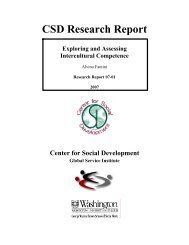Rediscovering social investment in developmental welfare state ...
Rediscovering social investment in developmental welfare state ...
Rediscovering social investment in developmental welfare state ...
Create successful ePaper yourself
Turn your PDF publications into a flip-book with our unique Google optimized e-Paper software.
R E D I S C O V E R I N G S O C I A L I N V E S T M E N T I N D E V E L O P M E N T A L W E L F A R E S T A T E P O L I C I E S :<br />
B A C K T O T H E F U T U R E<br />
production and clarify the types of <strong>social</strong> policies that constitute <strong>social</strong> <strong><strong>in</strong>vestment</strong>s, the<br />
characteristics of these policies, and the ways <strong>in</strong> which they <strong>in</strong>teract.<br />
The paper beg<strong>in</strong>s with a brief summary of some of the key limitations and theoretical challenges <strong>in</strong><br />
the literature. Follow<strong>in</strong>g this prelim<strong>in</strong>ary background, the rema<strong>in</strong>der of the paper is organized as<br />
follows. First, I describe how <strong>developmental</strong>ist pr<strong>in</strong>ciples are synthesized from several literatures,<br />
most notably the various strands of <strong>social</strong> development th<strong>in</strong>k<strong>in</strong>g, and how they can be applied to a<br />
<strong>welfare</strong> <strong>state</strong> literature that has not adequately conceptualized how productive <strong>social</strong> policies may<br />
work. Second, I relate these pr<strong>in</strong>ciples to exist<strong>in</strong>g and widely comparable <strong>social</strong> policy categories that<br />
are common across the <strong>welfare</strong> <strong>state</strong> literature <strong>in</strong> order to transcend the constra<strong>in</strong>ts of regime<br />
th<strong>in</strong>k<strong>in</strong>g. Third, I expla<strong>in</strong> why, <strong>in</strong> a political economic sense, DWSPs should be expected to work as<br />
they do, explicitly identify<strong>in</strong>g the assumptions that would have to apply for protective-productive<br />
outcomes to result. This approach draws on the notion of abduction (or <strong>in</strong>ference to the best<br />
explanation), which allows one to speculate about the sorts of mechanisms that can expla<strong>in</strong><br />
observed outcomes, and is especially valuable <strong>in</strong> cases where theory is underdeveloped, there is a<br />
need for new ideas, and there are surpris<strong>in</strong>g facts or observations to be expla<strong>in</strong>ed (M<strong>in</strong>nameier,<br />
2010). F<strong>in</strong>ally, I briefly discuss some tentative f<strong>in</strong>d<strong>in</strong>gs and the need for further exploration. The<br />
purpose of this project is to support future research by develop<strong>in</strong>g a conceptual pr<strong>in</strong>ciple-based<br />
framework that is flexible enough to accommodate evolv<strong>in</strong>g hypotheses about additional<br />
dimensions of DWSPs.<br />
Introduction to the Central Problem<br />
The <strong>social</strong> <strong><strong>in</strong>vestment</strong> perspective partly rests on a neoliberal <strong>in</strong>terpretation of <strong>social</strong> policy and<br />
partly on a much older Nordic legacy of <strong><strong>in</strong>vestment</strong> th<strong>in</strong>k<strong>in</strong>g reflected <strong>in</strong> the productivist ideas of<br />
Gunnar Myrdal from the 1930s that never coalesced <strong>in</strong>to a programmatically def<strong>in</strong>ed policy<br />
paradigm outside (or even <strong>in</strong>side) of Sweden. Hence, there is considerable ambiguity about what<br />
exactly is meant by <strong>social</strong> <strong><strong>in</strong>vestment</strong> (Leung, 2005). As Morel et al. (2012) note, while different<br />
terms and labels have been used to describe the productive turn <strong>in</strong> <strong>social</strong> policy—such as <strong>social</strong><br />
development, the <strong>developmental</strong> <strong>welfare</strong> <strong>state</strong>, <strong>social</strong> <strong><strong>in</strong>vestment</strong> <strong>state</strong>, enabl<strong>in</strong>g <strong>state</strong> and <strong>in</strong>clusive<br />
liberalism—all these analyses po<strong>in</strong>t toward a similar policy logic based on what can be labeled <strong>social</strong><br />
<strong><strong>in</strong>vestment</strong>. The <strong>social</strong> <strong><strong>in</strong>vestment</strong> <strong>state</strong>, said to be about moderniz<strong>in</strong>g the <strong>welfare</strong> <strong>state</strong> <strong>in</strong> response to<br />
new economic realities and <strong>social</strong> risks, has been widely translated <strong>in</strong>to the need for fundamentally new<br />
<strong>social</strong> policies. There is a tendency to focus on the ―productive potential of <strong>social</strong> policy‖ <strong>in</strong> hav<strong>in</strong>g to<br />
respond to ―a radically changed economic and <strong>social</strong> order,‖ and to assume that they are not<br />
productively oriented at present (Morel et al., 2012, p. 8).<br />
What has been given short shrift is how traditional <strong>welfare</strong> <strong>state</strong> policies relate to these new<br />
conditions. This paper offers a conceptual explanation for the <strong>developmental</strong> or productive effects<br />
of more extensive <strong>social</strong> <strong><strong>in</strong>vestment</strong>s (based on a reappraisal of several traditional <strong>social</strong> policies),<br />
recogniz<strong>in</strong>g that the <strong>social</strong> <strong><strong>in</strong>vestment</strong> approach is not an entirely new paradigm but rather that<br />
<strong>welfare</strong> <strong>state</strong>s have served an <strong><strong>in</strong>vestment</strong> function for some time. The neoliberal view of <strong>social</strong><br />
policy as a cost fundamentally overestimates the successful operation of the free market. The<br />
challenge for the <strong>social</strong> <strong><strong>in</strong>vestment</strong> perspective is to explicitly reconstruct the rationale for old forms<br />
of <strong>social</strong> policy (largely prepar<strong>in</strong>g <strong>in</strong> nature), as much as to offer rationales for new forms of <strong>social</strong><br />
policy (largely repair<strong>in</strong>g <strong>in</strong> nature). In short, us<strong>in</strong>g <strong>social</strong> development ideas to decipher and<br />
theoretically recover the <strong>developmental</strong> aspects of <strong>social</strong> policy <strong>in</strong> the Global North us<strong>in</strong>g the policy<br />
C E N T E R F O R S O C I A L D E V E L O P M E N T<br />
W A S H I N G T O N U N I V E R S I T Y I N S T . L O U I S<br />
5
















